Aviation Careers
Air Traffic Control Specialists

Air traffic control specialists (ATC) are an elite group of more than 14,000 people working across the country to ensure the safety and flight efficiency of aircraft, pilots, and 2.9 million daily passengers. FAA controllers work from more than 400 locations, including airport towers and radar facilities, monitoring and managing about 50,000 flights a day, during peak travel times. You can help manage the flow of aircraft on runways, guide pilots during takeoff and landing, and monitor aircraft as they travel from the ground, through the skies, and land safely back on the ground.
Being an air traffic controller is one of the best, most rewarding jobs in America, and the next generation at the Academy is the best in the world. I witnessed firsthand the dedication, skill, and rigor that our future air traffic controllers bring to their training and the urgent need to do all that we can to recruit more people to join in our shared mission of safety in our skies. - U.S. Transportation Secretary Sean Duffy
Airway Transportation Systems Specialists
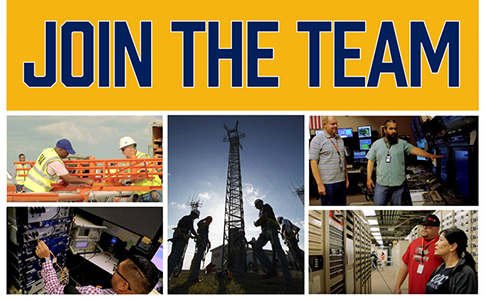
We're currently recruiting for entry-level positions at locations nationwide. Learn more.
The following five specialties encompass the duties of an Airway Transportation Systems Specialist (electronics technician):
Environmental
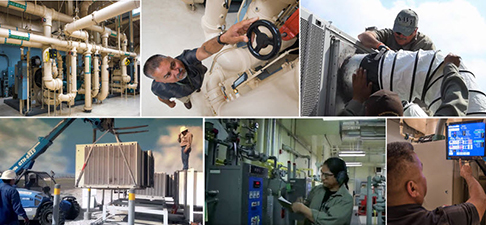
Technicians maintain and repair the following types of equipment: Lighted Navigational Aids Systems, Engine Generators (with or W/O Transfer Switches), Heating Ventilating and Air Conditioning Systems and Power Sources/Power Conditioning Systems.
Radar
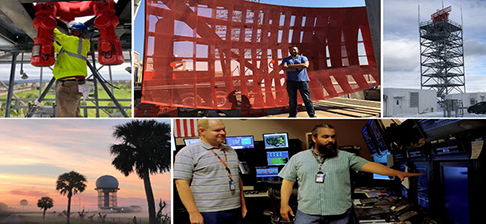
Technicians maintain and repair the following types of equipment: Airport Surveillance Radar, Air Route Surveillance Radar, Air Traffic Control Beacon Indicator, Airport Surface Detection Equipment, Terminal Doppler Weather Radar.
Navigational Aids
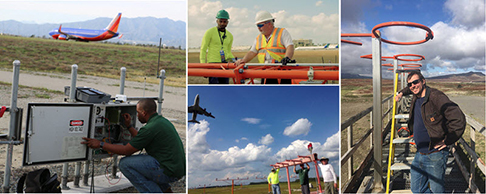
Technicians maintain and repair the following types of equipment: Instrument Landing Systems, Very High Frequency Omnidirectional Range (VORs), Doppler Very High Frequency Omni Directional Range (DVOR), Tactical Aircraft Control and Navigation (TACAN), and Distance Measuring Equipment (DMEs).
Communications
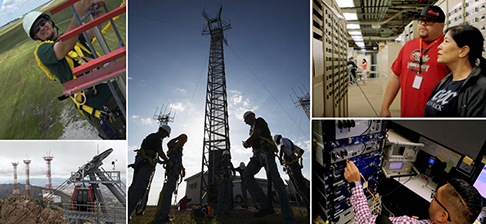
Technicians maintain and repair the following types of equipment: Motorola, ITT, or General Dynamics radios, Radio Communications Link Repeater, Low Density Radio Communications Link Repeater, Small Tower Voice Switch, Enhanced Terminal Voice Switch, Rapid Deployment Voice Switch, Digital Voice Recorder System, Digital Audio Legal Recorder.
Automation
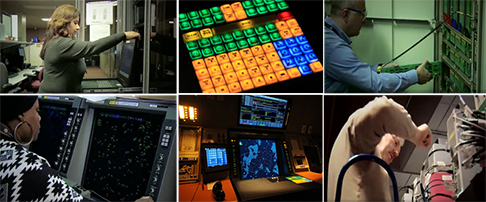
Technicians maintain and repair the following types of equipment: Automated Radar Terminal System, Direct Access Radar Channel, En Route Automation Modernization.
Aviation Safety Inspector (ASI)
FAA Aviation Safety Inspectors are involved in developing, administering, or enforcing regulations and standards concerning civil aviation safety. This includes the airworthiness of aircraft and aircraft systems; the competence of pilots, mechanics, and other airmen; and the safety aspects of aviation facilities, equipment and procedures.
A broad knowledge of the aviation industry (including general principles of aviation safety and the regulations and policies affecting aviation) is applied. In addition, extensive technical knowledge and skill in the operations, airworthiness (maintenance and avionics), or manufacture of aircraft and aircraft systems is needed.
Aviation Safety Inspector’s work in the following specialty areas:
Aircraft Dispatch
Oversees airline dispatch and operational control, ensuring compliance with regulations. They monitor dispatch centers and training facilities, provide expertise on policies, and agency orders, and investigate incidents. They also help certify new airlines and conduct regular observations for continuous compliance through the use of a planned surveillance and inspection program. Qualifications & Requirements.
Avionics (Air Carrier & General Aviation)
Evaluate avionics technicians, training programs and repair facilities; investigate incidents; inspect aircraft and related equipment. Qualifications & Requirements.
Cabin Safety
Develop, administer, or enforce regulations and standards concerning cabin safety policy and operations, including safety aspects of aviation facilities, equipment, and procedures. These jobs involve providing technical guidance to airlines, making sure they follow regulations, policies, and approved programs. They also oversee training programs, ensuring they are properly conducted and meet all requirements. Additionally, they take part in special projects to improve cabin safety and may be involved in certifying new operators. This work helps maintain high safety standards in the aviation industry. Qualifications & Requirements.
Flight Oversight (General Aviation, Air Carrier and Rotocraft-Helicopter)
Develop, administer, or enforce regulations and standards related to civil aviation safety, including the competence of pilots and other airmen. This ASI will not conduct certification (pilot evaluating, testing, and checking) job functions as a required crewmember, including safety pilot. This position will apply a broad knowledge of the aviation industry, aviation safety, and Federal aviation laws, regulations, and policies and participation in the FAA Flight Program would be in a simulator only. Qualifications & Requirements.
Maintenance (Air Carrier Maintenance & General Aviation Maintenance)
Evaluate aviation mechanics, facilities and training programs; inspect aircraft and related equipment for airworthiness. Qualifications & Requirements.
Manufacturing
Inspect aircraft, aircraft parts, avionics equipment and manufacturing facilities; issue production and original airworthiness certifications. Qualifications & Requirements.
Operations
The FAA is recruiting pilots for mission-critical Operations Aviation Safety Inspectors (ASIs) and is offering hiring incentives to entry level (defined as GS-9/11/12) candidates. Qualifications & Requirements.
Join our Team
- Now Hiring: Aviation Safety Inspectors
- Alternative Hiring for Flight Oversight Aviation Safety Inspectors
- Alternative Hiring for Manufacturing Aviation Safety Inspectors
- Alternative Hiring for Operations Aviation Safety Inspectors
- Application Helpful Hints
- Aviation Safety Organization (AVS)
- Aviation Safety Inspector (1825 series) OPM Basic Qualifications and Classification
Offices and Locations
Flight Program Operations - FlyFAA
We're currently recruiting for a variety of positions at locations nationwide. Learn more.
Flight Program Operations is the part of the FAA responsible for all aspects of program safety, administration, operations, training, and maintenance. We conduct multiple missions in FAA aircraft – whether it is owned, leased, rented, drones and more -- to provide aviation safety training; flight inspection; research, development, test and evaluation support; and critical event response/transportation.
The following positions encompass the unique duties of this team.
Pilots
In order to conduct flight inspections, our pilots take off and land, but they also make multiple passes at very specific altitudes in order to assess their targets. Pilots also fly as part of the research, development, test, and evaluation (RDT&E) support and critical event response/transportation missions.
Mission Specialists
Mission specialists have the opportunity to learn and use the highly specialized flight inspection and RDT&E equipment that is housed in the Flight Program Operations fleet. They take the measurements, record the observations, and file the daily flight log at the end of the day.
Scheduling and Dispatch
The Operations Control Center (OCC) is definitely the nerve center that keeps the rest of the Flight Program Operations body working at its best. OCC team members manage aircraft flight hours flown in support of our flight operations, improving scheduling processes and increasing scheduling efficiencies.
Mechanics
Our mechanics are constantly called upon to solve hard problems and ensure the availability of aircraft to fly missions when needed.
Safety and Training
Operating and maintaining aircraft are highly specialized and highly technical, which requires safety and training staff to be on point to ensure team members always have the required certifications and qualifications. We have an FAA safety management system that helps us turn safety data into information, and information into increased safety and targeted training.
